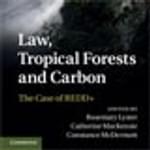Oxford Centre for Tropical Forests

The Oxford Centre for Tropical Forests was established with Oxford Martin School funding in 2008. Although the grant from the School ended in June 2015 the centre continues its research. The following page is an archived resource.

Tropical forests are perhaps the greatest treasures of life on Earth, housing half of all biodiversity, much of which has yet to be observed or described. To protect these resources, there is a need to develop further both state and non-state governance within the forest sector.
The Centre exists to strengthen understanding of how state and non-state institutions and actors shape decisions about the conservation and use of forest resources around the world.
The Oxford Centre for Tropical Forests brings together Oxford's vast intellectual capital and expertise on practical issues, creating a unique network of University departments and neighbouring NGOs, consultancies and businesses. It is a platform for broader collaboration between Oxford institutions and the global forest community.
Since 2009, the forest governance team has worked with partners at the universities of Queensland and Copenhagen, and the UN Environment Programme’s World Conservation Monitoring Centre (UNEP-WCMC) to create the Global Database on Protected Area Management Effectiveness (GD-PAME); the only global database on protected area management. The GD-PAME now holds data for over 9000 protected areas worldwide, and is being used to track global progress towards international conservation targets, and to measure the impact of protected area management interventions in conserving the world’s biodiversity.
The team has been involved in an EU-wide project looking at management of Europe’s forest landscapes, INTEGRAL. They have been reviewing the current state of knowledge on the EU’s global footprint, assessing EU policy responses, and considering how this knowledge might inform participatory processes addressing land use in the EU.
In 2012, the Centre launched the Global Ecosystem Monitoring network (GEM), an international effort to understand and measure forest ecosystems and how they will respond to climate change. The network now spans three continents, with data being gathered by more than 40 researchers across 10 projects. A busy online portal allows an international team to exchange knowledge, results and best practice.
Centre researchers are part of an international team that includes think tanks and NGOs, working to analyse the links between ecosystem services and sustainable poverty reduction. By examining how benefits derived from ecosystem services are distributed among different stakeholders, the factors underlying these processes and their potential impacts, the framework being developed will help decision-makers minimise negative impacts on equity and maximise positive impacts on poverty alleviation.
videos
"The concept of time in biology, and the unity of life" with Prof Brian J. Enquist
"The metabolism of a human-dominated planet" with Prof Yadvinder Malhi
Creating a climate for change: counting down to the 2015 UN climate negotiations
Megafauna - what was the impact of its loss, and should we 'rewild'?
Oxford Impacts - Rainforest biodiversity
The laboratory with leaves
What can the world's forests teach us about climate change?
The contradictions of forest certification in the promotion of sustainability
publications

Drought impact on forest carbon dynamics and fluxes in Amazonia

Andean grasslands are as productive as tropical cloud forests

Zero forest loss: Explored and unexplored solutions

Is the planet full?

Drought sensitivity of Amazonian carbon balance revealed by atmospheric measurements

How tree roots in tropical mountains have helped stabilise the Earth's climate

The legacy of the Pleistocene megafauna extinctions on nutrient availability in Amazonia

Law, Tropical Forests and Carbon: The Case of REDD+

100 fundamental ecological questions

Persistent effects of a severe drought on Amazonian forest canopy

Trust, legitimacy and power in forest certification:

Forest Tenure and governance in avoiding deforestation

Oil and gas in sub-Saharan Africa

Single-species conservation

Environmental Science & Policy

Embracing Complexity: Meeting the Challenges of International Forest Governance

The variation of apparent crown size and canopy heterogeneity across lowland Amazonian forests

Tropical Forest Governance in the 21st Century

Setting the Bar: an international comparison of public and private forest policy specifications and implications for explaining policy trends

Drought Sensitivity of the Amazon Rainforest

Exploring the likelihood and mechanism of a climate-change-induced dieback of the Amazon rainforest

The Production, Storage, and Flow of Carbon in Amazonian Forests
Keep in touch
If you found this page useful, sign up to our monthly digest of the latest news and events
Subscribe